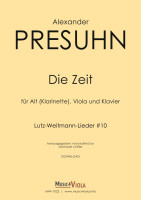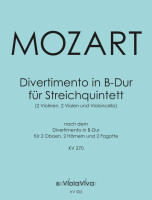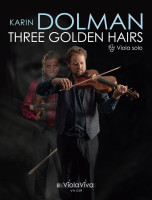
12 Questions for Martin Stegner, violist of various genres
Martin Stegner's sphere of influence is wide: member of the Berlin Philharmonic, initiator and arranger of various ensembles, such as the groovy ensemble Bolero Berlin, the Wu Wei Trio (Sheng, Viola, Double Bass) or the viola quartet of the Berlin Philharmonic “Violentango”.
He has arranged several works for Partitura Verlag: song arrangements by Schumann, Argentine and Finnish tangos and the Gershwin preludes. Stephanie Gurtner (founder and director of the publishing house) talks to him about arrangements for viola and about the viola as a jazz instrument, viola as a singing voice or viola in tango heaven.

Are arrangements for viola justified? Are they needed at all?
What would you say to someone who said, “First play everything that exists in the original.”
I think you shouldn't be wedded to the works for your own instrument, but play what you like. If something doesn't fit, it just has to be made to fit, that is, arranged. The most important thing is that you enjoy it, you don't always have to play it in public. The viola repertoire is comparatively small. In the past, it was generally taken for granted that pieces would be arranged: in the Baroque era, of course, but also in the Classical era. How many operas had harmonized music! People simply had to rely on arrangements because recordings did not yet exist. Today, with recordings available everywhere, this matter of course has been lost – unfortunately. How I long to have those days back!
There are arrangements for all instruments, but for viola there seem to be an especially large number of transcriptions and arrangements. What do you think: is it because of the lack of original literature? Or because of the greater willingness of viola players to experiment?
Clearly: the lack of original literature. But it's somehow understandable, because the viola has always had to make some kind of compromise. It's beautiful, but technically less virtuosic to play due to the stretching of the fingers and the width of the instrument, and it can't assert itself acoustically as well in the middle register.
What were your earliest experiences with arrangements? Were there any key works?
When I switched from violin to viola, I was studying Bach's Ciaccona and realized: OK, it's harder on the viola, but it really sounds better that way to me!
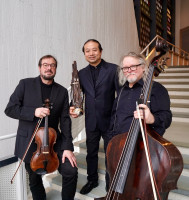
In your opinion, which works are well suited for adaptation to the viola? Which would you not adapt?
That depends mainly on the pitch. Literature for clarinet, for example, is better suited than that for trombone. Virtuoso pieces are also a bit problematic because it often no longer sounds like a viola.
You are also a jazz violist. How did you get into that?
Because I used to be a jazz violinist.
What makes it challenging for a “classical” musician – besides improvisation – to play jazz? Or, conversely, if you've been playing jazz for several days: is it difficult to get back into classical mode?
I think such prejudices are nonsense. My teacher once said that I would ruin my technique. The opposite was the case: it was only through jazz that I really got to know my instrument! My experience is clear: playing jazz is a musical enrichment!
And now to the Wu Wei Trio, you play music from a wide range of different periods. What is special about making music in this trio? How do you go about choosing works?
It's not that easy, because you can't play everything on the sheng, certain finger combinations – that is, tone sequences – are extremely laborious and therefore difficult to master in presto. In addition, we have to try out how it works with the registers of the instruments. There are many challenges.
You play Finnish tangos with the viola quartet Violentango. Do you find that mainly funny? Or do you sink into happy melancholy?
First and foremost, we just have fun playing as a quartet. But you're right in your ironic allusion: a bit of melancholy always sets in.
You have also arranged Finnish tangos and the four Preludes by George Gershwin for our publishing house, for a more conventional line-up, namely a string trio. What would you say: is it more difficult to expand a piano piece to three instruments or to reduce a tango band line-up to three?
It depends on the pieces. In both directions, there are pieces that literally jump out at you for an arrangement! With a trio, you simply have the problem that one part is always missing, even with Beethoven the viola is often allowed to take over two parts at the same time...
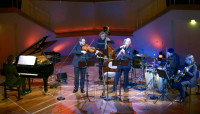
You have also published Schumann's song cycle “Dichterliebe” for viola and piano for Partitura Verlag. Was that a project close to your heart?
Absolutely! I still have a whole stack of song arrangements at home. Songs are simply perfect for the viola, because our timbre is so close to the voice.
So are song arrangements generally well suited to the viola?
In principle, yes. But with strophic songs, you have to try them out, because they soon risk becoming boring. What's more, if you play songs in their original key, the viola sounds like a not-so-good violin. If you transpose down, the listeners won't understand anything. So you have to transpose up. The biggest problem then is actually the piano: the transposition shouldn't make it sound grotesquely low.
Both amateurs and professionals play your arrangements. What tips would you give amateurs and professionals respectively?
The same tip for both: feel free! I see my arrangements only as a basic framework for the creativity of the performers: make of it what is right for you!
Thank you for the interview and continue to enjoy arranging, performing and jazz!
Useful links for Martin Stegner:
New in the download service |
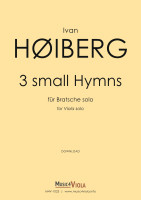
3 small Hymns
for Viola solo
Die Zeit
for Alto (Clarinet), Viola and Piano
New printed editions |
Divertimento in B-Dur
arranged for string quintet
(2 Violins, 2 Violas and Cello)
Editor: Helmut Pfrommer
Three Golden Haies
for Viola solo
based on a fairy tale by the Brothers Grimm
» to the edition with preview
Viola Newsletter |
 Do you don't want to miss any news regarding viola anymore? Our monthly viola news letter will keep you informed.
Do you don't want to miss any news regarding viola anymore? Our monthly viola news letter will keep you informed.
» Subscribe to our viola letter for free
|
|
 Visit us on Instagram and don't forget to join our music community and share your thoughts about the composer or any other viola-related ideas!
Visit us on Instagram and don't forget to join our music community and share your thoughts about the composer or any other viola-related ideas!
» Music4Viola on Instagram
|
|
 Visit and like us on Facebook. The news articles are also posted.
Visit and like us on Facebook. The news articles are also posted.
» Music4Viola on Facebook
